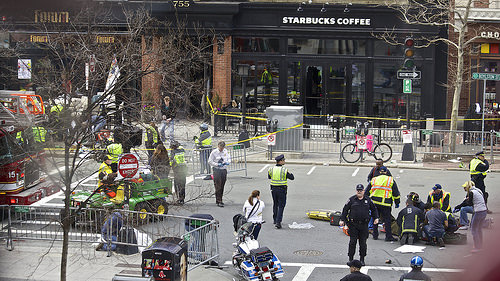On Moving Forward: Reflecting on the Boston Bombings
It has been an emotionally taxing year for everyone in Boston. First, Hurricane Sandy slammed the entire Eastern Seaboard and left thousands of people without homes. That was followed by winter storm Nemo, and people were urged to stay off the roads for their own safety.
Then two weeks ago, the entire city was under lockdown while a battle raged between law enforcement and the Marathon Monday bombing suspects. I had never felt unsafe here until the Friday after the bombings, when I was forced to stay in my apartment as a safety precaution against the suspects at large.
The night before the lockdown on Friday, April 19th, I heard about the MIT police officer who had been shot from a friend of mine. I was chatting on Facebook with him, and I remember saying the shooting was probably not connected with the bombings.
[pullquote]I remember saying the shooting was probably not connected with the bombings[/pullquote]
“The robber must have been caught off-guard by the officer and that was the only reaction he had,” I thought. I went to bed around 1 a.m., right after we finished talking. I didn’t think much of it, and figured it would pass after a bit of news coverage the next day.
The next morning was possibly the most disoriented I have felt in all of my 19 years. I had multiple text messages from my university’s alert system urging me to stay inside and report any suspicious activity in my area. I had texts from the same friends who had asked if I was okay that Monday, and I had no idea why. I quickly opened my computer and began sifting all the news outlets I could think of to figure out what had happened. In the seven hours I had been asleep, there had been a car jacking, a car chase, and a shoot-out.
I spent that Friday from 8 a.m. to 7 p.m. in my pajamas and glued to my TV, watching Anderson Cooper, Wolf Blitzer, and other famous CNN newscasters broadcasting from the T stop I use when I go down to Newbury Street. Local newscasters were broadcasting from nearby Watertown, where the second suspect was hiding. Even when the lockdown was lifted around 7 p.m., it was nerve-wracking to be outside. The entire city felt hesitant; even the air was hot and still. It wasn’t until the police captured Dzhokhar Tsarnaev that it felt like the city of Boston could exhale and relax.

Courtesy of Rebecca_Hildreth
My father was in Boston for business last weekend, and was staying at the Marriott Hotel near Copley Square. I had gone to a Red Sox game with some friends earlier that day and was making my way over so he and I could grab dinner in the North End. I was waking around Copley Square when I got slightly turned around. I rounded a corner and was met with the memorial of the bombing.
It was the first time I had been in that area since the Marathon, and I was caught off-guard. Somehow I hadn’t imagined it was so close. There were hundreds of flowers, candles, posters, and news trucks still milling about the area. I was on the phone with my mom at the time, and had to hang up so I could walk closer to the memorial without feeling disrespectful. As I walked closer, I saw that the flowers, candles, and posters came from people from all over the country and the rest of the world.
But all the turmoil and heartache and fear that have littered that past few weeks in Boston is dissipating.
Boston University didn’t close its doors the Tuesday after the bombings. As my best friend Danni McGovern, a second-year student at BU’s College of Communication, put it, “It’s good to have a sense of normalcy after something like that happens.”
She’s right. While grieving itself is not inherently bad, it was nice to have a sense of the normal routine instilled across the campus following both the bombings and the subsequent lockdown. While many students, faculty, staff, and passersbys chose to remain at home or in places of comfort, the world around us turned on, and it was business as usual to the greatest extent possible.
I don’t know what the policy was at other schools, but as far as I can tell, BU is getting back to normal. Boxes are being packed across campus, internships are being planned and we’re all getting antsy for summer months full of beach trips and parties.
I can only hope that the rest of Boston is able to cope with the tragedy like the BU community has. The sense of togetherness here is so strong that I have no doubt Boston will be able to recover.
[pullquote]The sense of togetherness here is so strong that I have no doubt Boston will be able to recover.[/pullquote]
Quickly after the bombings, the One Fund Boston was created to financially assist those most affected by the actions of Dzhokhar and Tamerlan Tsarnaev. The victims of the bombings have been honoured at sporting events and other activities across the city and the nation. Just last night, bombing victim Jeff Bauman was made the banner captain at the Bruins game against the Maple Leafs.
While what happened on Monday, April 15 will forever mark the reputation of Boston, I am confident that it won’t leave a mark on its people. We are all forcing ourselves to get back to our routines. We haven’t forgotten about the bombings or the victims, and I don’t think we ever could. We are merely moving forward, and are confident that those responsible for the bombings will be swiftly and sufficiently punished for their actions.
























Share the post "On Moving Forward: Reflecting on the Boston Bombings"